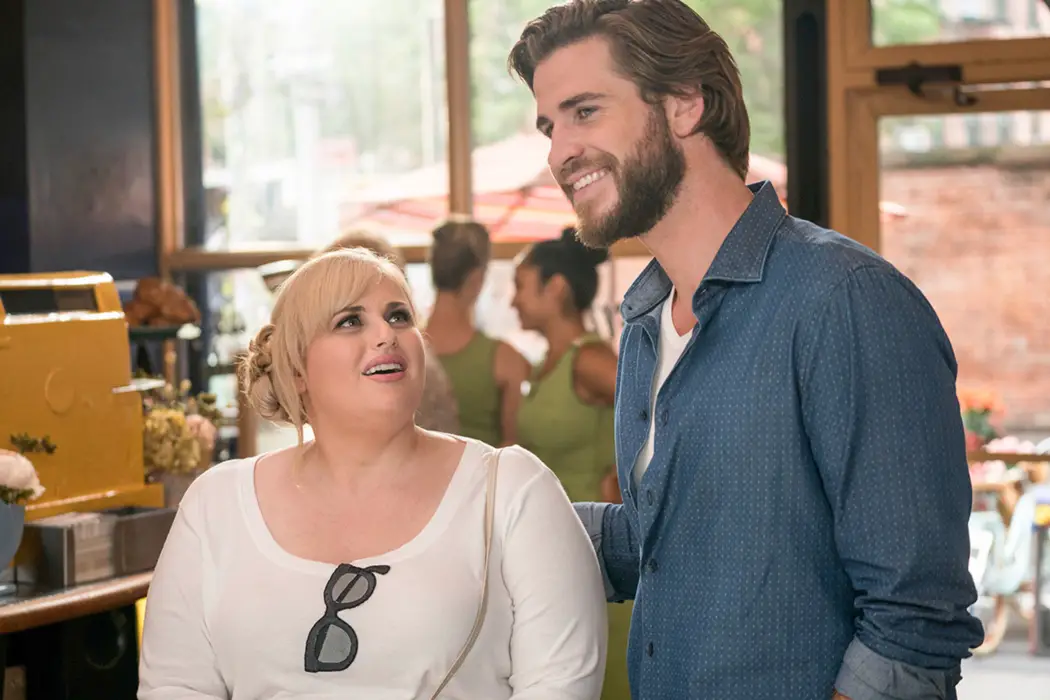ISN’T IT ROMANTIC: An Empowering Story Disguised As A Self-Satisfied Satire

Kevin L. Lee is an Asian-American critic, producer, screenwriter and…
So this kind of worked. But probably not the way you expected.
Isn’t It Romantic is marketed as a satire that mocks the clichés of the romantic comedy sub-genre. After all, the plot literally involves our lead protagonist (Rebel Wilson) hitting her head and waking up in a world where every single rom-com trope plays out unapologetically in front of her (in PG-13 fashion). But underneath all the meta jokes is a surprisingly empowering story about female representation. The moral itself makes the film recommendable, but is it a great film? That will depend on whether or not you laughed.
Using Cliché Recognitions to Garner Laughs
Let’s get the biggest issue out of the way first. I did not find the film to be that funny. Aside from a bombastically gay character (done on purpose) and a rather clever joke about the F-word, a lot of the film’s “jokes” are simply rooted in cliché recognitions. Wilson’s Natalie is a character who grew up cynical of all the romantic comedy tropes, largely because they are too perfect and too much of a fantasy. And so, after Natalie gets stuck in this fantasy world, what’s supposed to be a dream come true is an expected nightmare for her.

But the script couldn’t find that many clever ways to get a laugh. Most of the runtime is Wilson pointing at a trope in front of her and groaning about it, and the film expects us to laugh just because we recognize that trope. Rinse and repeat. It can only go so far. You need a build-up. You need a punchline. Unfortunately, a lot of the film is just “Oh, I recognize that cliché. I’ve seen it from this other rom-com. That’s funny. Haha.” At times, Natalie’s cynicism makes the film feel like it’s talking down to its audience for loving these tropes in the first place. Almost.
Some Storytelling Problems and Lack of Details
Aside from three scenes that add up to a total runtime of three minutes, you wouldn’t know what Natalie’s job is (she’s an architect). Her job is also never relevant to the plot until the very end of the film, which feels like a missed opportunity. For example, the film tells us that Natalie has a passion for architecture. But we barely get to see her work on an actual architectural design. Even in a scene where she draws out blueprints and concept art, the camera never looks at the artwork for the audience to see how talented Natalie is.

The script could’ve even killed two birds with one stone and have Natalie point out the architecture in some building that’s commonly seen in romantic comedies. There’s also Whitney (Betty Gilpin), a supporting character who fits the “work rival” archetype against Natalie, except the film never shows us what they’re rivaling about. What are they competing for? Granted, these aren’t the most glaring issues in terms of writing, but when the film isn’t that funny, your mind can wander off to these kinds of things.
The Holy Trinity – Rebel Wilson, Adam DeVine, and Liam Hemsworth
If you are a fan of any of the three actors I named above, then this is for you. I can say, as a bigger fan of Chris than Liam, that Isn’t It Romantic used Liam Hemsworth to near perfection. He balances the attractive and brainless hunk persona so naturally, it plays off of Wilson with some amusing results. If Wilson was behind the casting decision, then this is the smartest casting choice since Joseph Gordon-Levitt bringing in Scarlett Johansson for his Don Jon.
But the real seller is Wilson and her chemistry with Adam DeVine, who has never been this charming, as I can recall. Take their relationship in Pitch Perfect 2 and elevate it. It’s got the awkwardness, dorkiness, and cuteness in modern romances. I want a lot more movies starring just the two of them.

Wilson proves she can carry an entire movie on her own as the lead. With her constantly being put into other comedies as “that fat comic relief girl,” her lead role here comes off as a proud statement. And like how the film treats Wilson, I too am rooting for her. The film’s stance towards Natalie is one of love. After all, she’s the star of a PG-13 romantic comedy and everything in that world is designed to appeal to her. Yet she rejects it all. Can she be THAT cynical? Of course not. Her attitude towards those rom-com tropes come from something that’s far more sophisticated. It’s a very true struggle that I believe audience members can relate to.
Isn’t It Romantic: The Moral Outshines the Lack of Laughs
I have a bizarre relationship with Isn’t It Romantic. I found everything that worked with the film to be nothing related to its comedy. There are some issues in the writing that comes off as too procedural or too bothersome. But at the end of the day, there is a rather moving story here that I found to be… beguiling. It will certainly resonate to female audiences.
Wilson, DeVine, and Hemsworth are fantastic here, and there are a couple musical numbers that are not as cringy as you would think they are. Isn’t It Romantic is not a game-changer in the romantic comedy sub-genre, but it’s a proud statement by Wilson that everyone should get behind.
Did you see Isn’t It Romantic? What did you think of the film? Share below!
Isn’t It Romantic was released in theaters in the US on February 13, 2019. For all international release dates, see here.
Does content like this matter to you?
Become a Member and support film journalism. Unlock access to all of Film Inquiry`s great articles. Join a community of like-minded readers who are passionate about cinema - get access to our private members Network, give back to independent filmmakers, and more.
Kevin L. Lee is an Asian-American critic, producer, screenwriter and director based in New York City. A champion of the creative process, Kevin has consulted, written, and produced several short films from development to principal photography to festival premiere. He has over 10 years of marketing and writing experience in film criticism and journalism, ranging from blockbusters to foreign indie films, and has developed a reputation of being “an omnivore of cinema.” He recently finished his MFA in film producing at Columbia University and is currently working in film and TV development for production companies.













